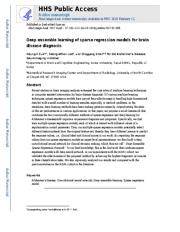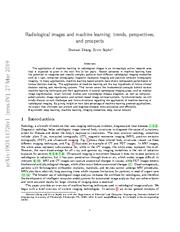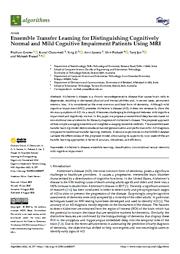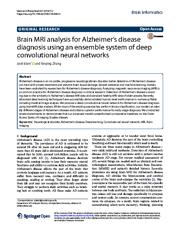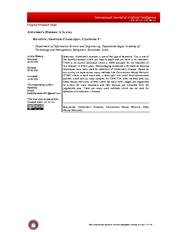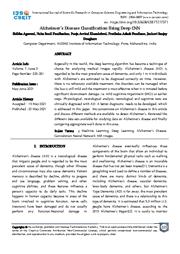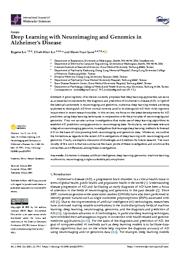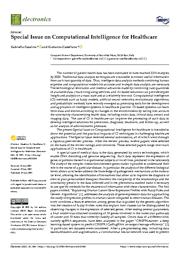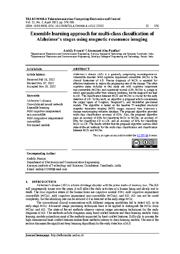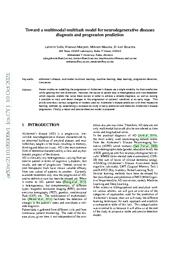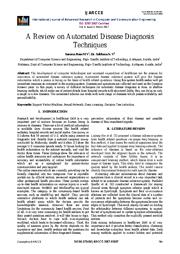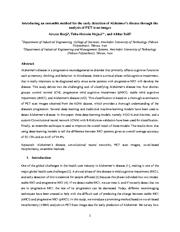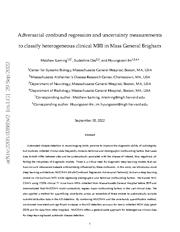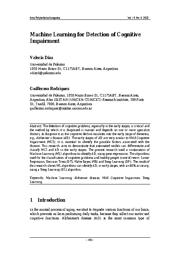A copy of this work was available on the public web and has been preserved in the Wayback Machine. The capture dates from 2020; you can also visit the original URL.
The file type is application/pdf.
Filters
Deep ensemble learning of sparse regression models for brain disease diagnosis
2017
Medical Image Analysis
Ensemble Sparse Regression Network.' ...
In this paper, we propose a novel framework that combines the two conceptually different methods of sparse regression and deep learning for Alzheimer's disease/mild cognitive impairment diagnosis and prognosis ...
Acknowledgments Data used in preparation of this article were obtained from the Alzheimer's Disease Neuroimaging Initiative (ADNI) database (http://www.loni.ucla.edu/ADNI). ...
doi:10.1016/j.media.2017.01.008
pmid:28167394
pmcid:PMC5808465
fatcat:j56bwaxjrvd5tg6weciyw2dng4
Radiological images and machine learning: Trends, perspectives, and prospects
2019
Computers in Biology and Medicine
diagnosis, as well as computer-aided systems, image registration, and content-based image retrieval systems. ...
By giving insight on how take advantage of machine learning powered applications, we expect that clinicians can prevent and diagnose diseases more accurately and efficiently. ...
Ensemble learning in brain studies Ensemble learning methods combines multiple classifiers, which is popular in Alzheimer's disease diagnosis. ...
doi:10.1016/j.compbiomed.2019.02.017
pmid:31054502
pmcid:PMC6531364
fatcat:tcyorm6g3ff6dg7ty2ubtqorjq
Ensemble Transfer Learning for Distinguishing Cognitively Normal and Mild Cognitive Impairment Patients Using MRI
2023
Algorithms
In this paper, we propose an ensemble of deep learners based on convolutional neural networks for the early diagnosis of Alzheimer's disease. ...
The ensemble-based transfer learning model demonstrates enhanced generalization and performance for AD diagnosis compared to traditional transfer learning methods. ...
By combining the predictions of these models, we aim to improve the extraction of sparse patterns and features from MRI images for Alzheimer's disease diagnosis. ...
doi:10.3390/a16080377
fatcat:umbnlq73obcwtaxeju4544mlp4
Brain MRI analysis for Alzheimer's disease diagnosis using an ensemble system of deep convolutional neural networks
2018
Brain Informatics
We propose a deep convolutional neural network for Alzheimer's disease diagnosis using brainMRI data analysis. ...
Several statistical and machine learning models have been exploited by researchers for Alzheimer's disease diagnosis. ...
Our research work focuses on analyzing sMRI data using deep learning model for Alzheimer's disease diagnosis. ...
doi:10.1186/s40708-018-0080-3
pmid:29881892
fatcat:zybwvmkiwfh5bedzaisbooxbry
Alzheimer's Disease: A Survey
2021
International Journal of Artificial Intelligence
There are many such methods which can be used for detection of Alzheimer's Disease. ...
In recent years, Neuroimaging combined with machine learning techniques have been used for detection of Alzheimer's disease. ...
Deep Neural Network In Kajal Kiran Gulhare, et al [14] DNN classification is considered to be a tool for Alzheimer disease detection. ...
doi:10.36079/lamintang.ijai-0801.220
fatcat:s5375uw5j5hxlci3yj4tz6icfu
Alzheimer's Disease Classification Using Deep CNN
2021
International Journal of Scientific Research in Computer Science Engineering and Information Technology
Especially in the world, the deep learning algorithm has become a technique of choice for analyzing medical images rapidly. ...
Reviewed the different data sets available for studying data on Alzheimer's disease and finally comparing appropriate work done in this area. ...
DEEP LEARNING NETWORKS Several common deep learning networks like CNN models are addressed in this paper. ...
doi:10.32628/cseit217371
fatcat:6tgqbmj2ordkrmytqgetycyp4e
Deep Learning with Neuroimaging and Genomics in Alzheimer's Disease
2021
International Journal of Molecular Sciences
A growing body of evidence currently proposes that deep learning approaches can serve as an essential cornerstone for the diagnosis and prediction of Alzheimer's disease (AD). ...
In this review, we focus on the latest developments for AD prediction using deep learning techniques in cooperation with the principles of neuroimaging and genomics. ...
ACC = accuracy; AD = Alzheimer's disease; ADNI = Alzheimer's Disease Neuroimaging Initiative; AUC = the area under the curve; CNNs = Convolutional Neural Networks; CV = cross-validation; DBNs = Deep belief ...
doi:10.3390/ijms22157911
pmid:34360676
pmcid:PMC8347529
fatcat:x5rhz7wlx5gmbjgeezjy3mbl34
Special Issue on Computational Intelligence for Healthcare
2021
Electronics
The paper entitled "Integrating Enhanced Sparse Autoencoder-Based Artificial Neural Network Technique and Softmax Regression for Medical Diagnosis" [9] addresses the problem of unbalancement in medical ...
The paper "An Ensemble Learning Approach Based on Diffusion Tensor Imaging Measures for Alzheimer's Disease Classification" [6] presents an ensemble learning approach for the automatic discrimination ...
doi:10.3390/electronics10151841
fatcat:6idy2z7ixrh73fre3feocf55u4
Ensemble learning approach for multi-class classification of Alzheimer's stages using magnetic resonance imaging
2023
TELKOMNIKA (Telecommunication Computing Electronics and Control)
Precise diagnosis of MCIc is essential for effective treatments to reduce the progressing rate of the disease. ...
Alzheimer's disease (AD) is a gradually progressing neurodegenerative irreversible disorder. Mild cognitive impairment convertible (MCIc) is the clinical forerunner of AD. ...
ACKNOWLEDGEMENTS Data used in the preparation of this article were obtained from the Alzheimer's disease neuroimaging initiative (ADNI) database (http://adni.loni.usc.edu). ...
doi:10.12928/telkomnika.v21i2.23352
fatcat:f7hx5zmycberhekmhtphhpwu4m
Toward a multimodal multitask model for neurodegenerative diseases diagnosis and progression prediction
[article]
2021
arXiv
pre-print
Alzheimer's disease progression. ...
Recent studies on modelling the progression of Alzheimer's disease use a single modality for their predictions while ignoring the time dimension. ...
., 2020) proposed a robust ensemble deep learning model based on a stacked convolutional neural network (CNN) and a bi-directional long-term memory network (BiLSTM). ...
arXiv:2110.09309v1
fatcat:52n6u73lefgndlkp72ljimh5pu
A Review on Automated Disease Diagnosis Techniques
2017
IJARCCE
Diseases and symptoms are collected and used as the Question Answer pairs. In this paper, a survey of different techniques for automatic disease diagnosis is done. ...
The development of computer technologies and increased expenditure of healthcare are the reasons for innovation of automated disease inference system. ...
[13] presented a sparse deep learning algorithm for recognition and categorization. ...
doi:10.17148/ijarcce.2017.63187
fatcat:bxgqlbcyyzc5tjstmb6xdc6ogi
GAN-based Multiple Adjacent Brain MRI Slice Reconstruction for Unsupervised Alzheimer's Disease Diagnosis
[article]
2020
arXiv
pre-print
However, without considering continuity between multiple adjacent slices, they cannot directly discriminate diseases composed of the accumulation of subtle anatomical anomalies, such as Alzheimer's Disease ...
Therefore, we propose a two-step method using Generative Adversarial Network-based multiple adjacent brain MRI slice reconstruction to detect AD at various stages: (Reconstruction) Wasserstein loss with ...
reduce the need for labeled training data [13] ; for clinical decision-making, Suk et al. integrated multiple sparse regression models (namely, Deep Ensemble Sparse Regression Network) [14] ; Spasov ...
arXiv:1906.06114v5
fatcat:23inzriztbe4ngga6kj7kpz4qe
Introducing an ensemble method for the early detection of Alzheimer's disease through the analysis of PET scan images
[article]
2024
arXiv
pre-print
In this paper, three deep-learning models, namely VGG16 and AlexNet, and a custom Convolutional neural network (CNN) with 8-fold cross-validation have been used for classification. ...
Several deep-learning and traditional machine-learning models have been used to detect Alzheimer's disease. ...
She et al. introduced a multimodal stacked deep probabilistic network (MM-SDPN) for Alzheimer's diagnosis, demonstrating the efficacy of combining multiple data modalities to enhance AD classification ...
arXiv:2403.15443v2
fatcat:o3ldxmozpfcvrmww63lyo6ioia
Adversarial confound regression and uncertainty measurements to classify heterogeneous clinical MRI in Mass General Brigham
[article]
2022
arXiv
pre-print
In this work, we introduce a novel deep learning architecture, MUCRAN (Multi-Confound Regression Adversarial Network), to train a deep learning model on clinical brain MRI while regressing demographic ...
MUCRAN offers a generalizable approach for heterogenous clinical data for deep-learning-based automatic disease detection. ...
Sparse gradients, such as ReLU and max pooling, were avoided in the construction of the networks. ...
arXiv:2205.02885v2
fatcat:jwxsnuo3ifd7jos64vc64x6hg4
Machine Learning for Detection of Cognitive Impairment
2022
Acta Polytechnica Hungarica
The algorithms used for the classification of cognitive problems and healthy people (control) were: Linear Regression, Decision Trees (DT), Naîve Bayes (NB) and Deep Learning (DP). ...
., Alzheimer's disease (AD). The early stages of AD are very similar to Mild Cognitive Impairment (MCI); it is essential to identify the possible factors associated with the disease. ...
Some researchers employed ensemble approaches to increase Alzheimer's disease classification accuracy [24] [25] [26] . ...
doi:10.12700/aph.19.5.2022.5.10
fatcat:pzyv7o4wnfd4ljbyvkb4xo4l4e
« Previous
Showing results 1 — 15 out of 626 results

